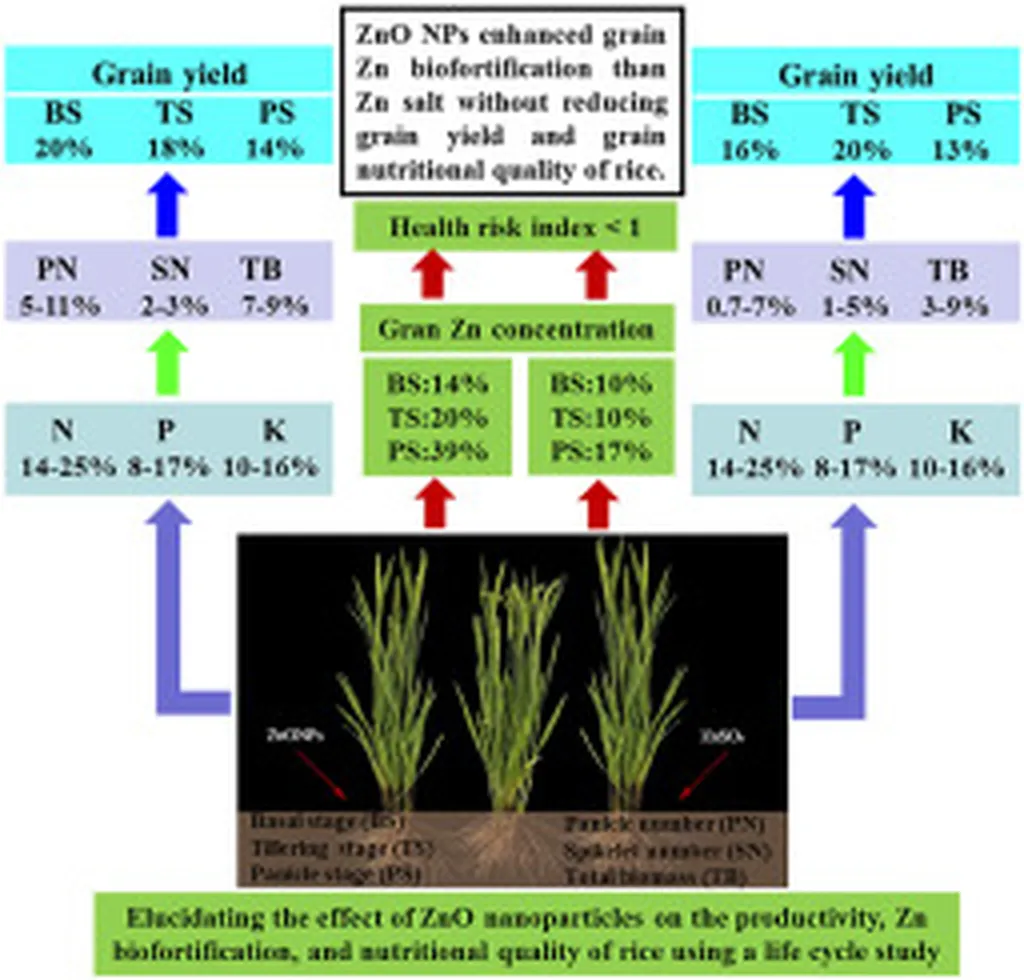In a groundbreaking study published in *Scientific Reports*, researchers have demonstrated a novel approach to enhance rice yield and nutritional quality using zinc oxide nanoparticles (ZnO NPs). This innovative method, developed by Aishwarya J. Gamit from the Department of Plant Molecular Biology and Biotechnology at Navsari Agricultural University, offers a promising solution to combat zinc deficiency in rice, a staple food for over half the world’s population.
The study explored the application of biosynthesized ZnO nanoparticles through seed priming and foliar sprays. The researchers found that priming rice seeds with 25 ppm of ZnO nanoparticles for 24 hours significantly improved germination rates and seedling vigor. This optimized treatment, when combined with a foliar spray of 100 ppm ZnO NPs during the panicle emergence and grain filling stages, led to remarkable improvements in plant growth, yield, and zinc accumulation in both grains and straw.
“Our findings indicate that this integrated approach of seed priming and foliar application of ZnO nanoparticles can significantly enhance rice productivity and nutritional value,” said Gamit. “This method not only addresses the critical issue of zinc deficiency but also offers a sustainable and cost-effective solution for farmers.”
The field trials revealed a substantial increase in grain yield, straw yield, and zinc content compared to conventional methods. Biochemical analyses further showed elevated levels of chlorophyll, total protein, and antioxidant enzyme activities, which are crucial for plant development. Additionally, the study observed increased levels of phytohormones such as gibberellic acid (GA₃), indoleacetic acid (IAA), and salicylic acid (SA), contributing to improved vegetative and reproductive performance.
One of the most significant aspects of this research is the modulation of key zinc transporter genes (OsZIP1.1, OsZIP3, OsNAAT1, and OsYSL14) in root and flag leaf tissue. This modulation indicates enhanced zinc uptake, translocation, and accumulation in the grain, which is essential for improving the nutritional quality of rice.
The commercial implications of this research are vast. With zinc deficiency affecting a significant portion of the global population, this innovative approach can revolutionize the agriculture sector by providing a sustainable solution to enhance crop productivity and nutritional value. Farmers can benefit from increased yields and improved crop quality, while consumers can enjoy healthier and more nutritious rice.
“This study highlights the potential of biogenic ZnO NPs as a sustainable and cost-effective strategy for zinc biofortification in rice,” Gamit added. “It offers a novel solution to combat micronutrient deficiencies while improving plant productivity and nutritional quality.”
As the agriculture sector continues to seek sustainable and innovative solutions to address food security and nutritional challenges, this research paves the way for future developments in the field. The integration of nanotechnology in agriculture holds immense promise for enhancing crop productivity, improving nutritional quality, and ensuring food safety for a growing global population.

